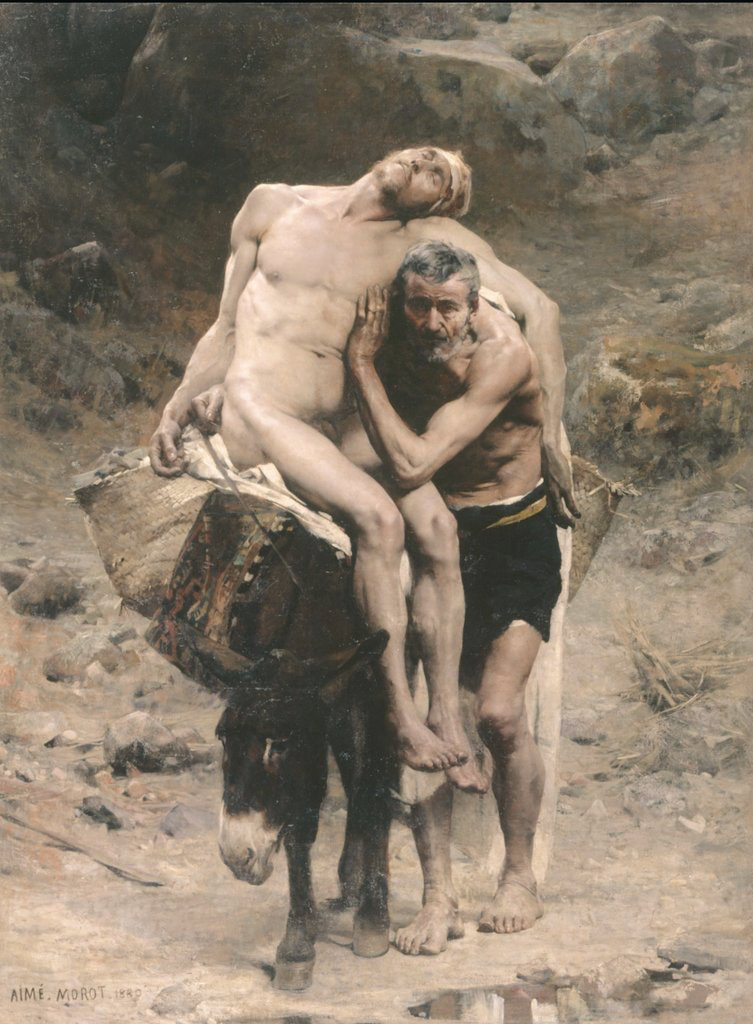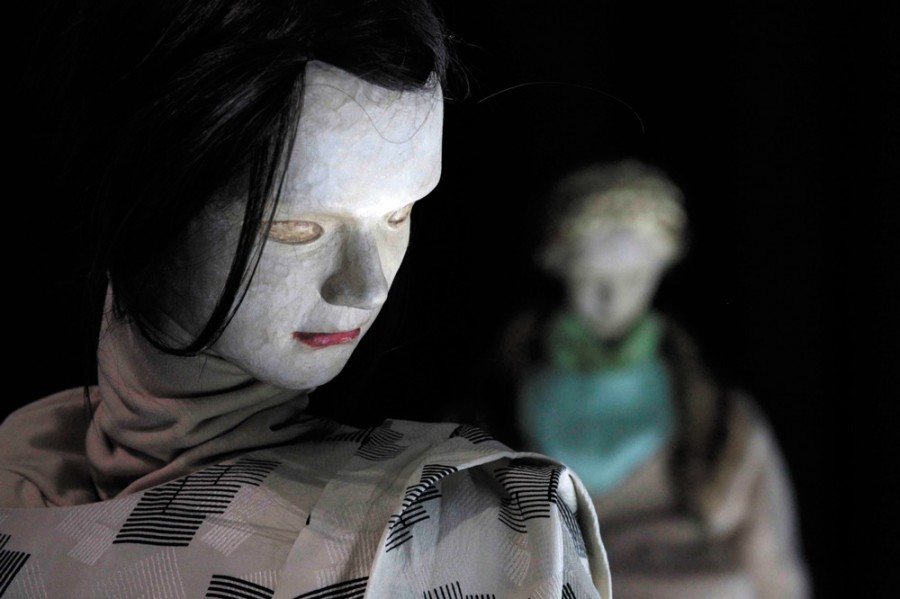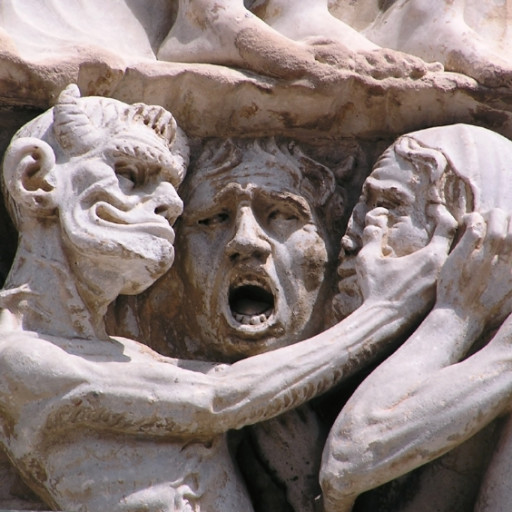Monastic prayer of the 12th century
teach me, Lord, to use the time you give me to work ...
Teach me to unite the haste and slowness, serenity and fervor, zeal and peace. Help me at the start of the book. Help me at the heart of the work ... and above all fill the voids of my work yourself: Lord, in all work of my hands leave a grace of you to talk to others and a defect of me to talk to myself.Keep the hope of perfection in me, otherwise I would lose heart. Keep me in the helplessness of perfection, otherwise I would get lost in pride ...
Lord, never let me forget that all work is empty except where there is love ...
Lord, teach me to pray with my hands, my arms and all my strength. Remind me that the work of my hands belongs to you and that it belongs to me to give it back to you by giving it ... that if I do to please others, like the flower of the grass I will fad in the evening. But if I do for the love of good, I will remain in good. And the time to do well and your glory is immediately.
Amen
Tag: religion
Antigone, rebellious and intimate (7/7. Love)
7th and last part: Love

Antigone's desire is family, she does not want to leave her brother unburied; Creon, he wants to assert himself as king and show his power. Antigone favors family ties that embody love and reveal a being. Creon establishes his power by signing an act of law which must establish his authority. The same word characterizes their action: desire. But desire does not recognize desire in the other, one might believe, especially if one is tempted to worship desire for itself, that desire dubs any desire it encounters. Between Creon and Antigone, it is the measure of the desires that counts. Face to face, Antigone and Creon will increase the measure of their desires to the adversity they encounter. But is the source of Antigone's desire still understandable today? Indeed, Antigone's desire, this desire which is based on justice, justice done and returned to the remains of her brother and to the gods, this desire takes on its full meaning, because it is communal, it is part of a city and in a family, reduced vision of the city, and in a belief, Antigone leans against the gods to challenge Creon. Antigone does not express a personal desire, she defends an eternal law, she defends her duty to say it, to claim it before any power that thinks itself above her. Since when do we no longer hear anyone standing up in the public space to claim their duty at the cost of their life? The worst ? We have become accustomed to this silence, this resignation, the transcendental laws no longer tell us much, so nothing comes to overhang and therefore correct the laws which pass in front of us and encircle us like rubbish in a stream of water. The communities that fortified the individual within a space that protected him and allowed him to grow were shattered. The individual now looks like a crazy electron who can only build himself up from gusts of wind that constantly exhaust him and confuse him and erase even the taste for the meaning to be given to his life. Social life is based on law and law alone, but in a place without geography made up of people above ground, all rights are equal and crushed in an odious shambles. Creon has the power. Antigone is the daughter of Oedipus. At a time when it is no longer a question of having, of possessing, of acquiring, Antigone weighs—since it is necessary to evaluate—very little. The methodical destruction of all metaphysics is akin to a crime against humanity. Perhaps the greatest the world has ever known. Since with one click, I can acquire everything, I only need to know my desire to satisfy it. We also understand that this individual desire that nothing protects from his appetite accepts no limits and especially not those set by others; then comes into play envy, debased, debased desire.
Read the rest of "Antigone, rebellious and intimate (7/7. Love)"
Antigone, rebellious and intimate (6/7. The vocation)

What stories about identity! The word does not appear neither in the Greek epic nor in the tragedy. The identity at the time of Antigone is leaning on the line and belonging to a city. Identity was soaked from rooting. The family and the city brought together under a virtual standard the entirety of what the other should know about oneself during a first meeting. During Antiquity, no one proclaimed their identity or promulgated it, and no one decided on its identity. It was not a question of putting a costume. Men were in their identity. The identity was akin to a charge, we had to be worthy of it. She ruled being and becoming. Modern era has made an issue, because it has transformed the identity to have, a sort of achievement which can be disputed or departing. In its modern fantasy to believe that you can choose everything all the time, the modern era replaced with a relentless method being by having it. Yet this logic, this ideology has its limits: certain things cannot be acquired, among them: otherness. Living your identity, being what you are, living in your name , allowing intimacy and therefore the knowledge and deepening of your being, these are the sine qua non conditions of one meeting with the other. The first difference between Creon and Antigone is at this specific location, the terrain on which the fight is built, Antigone preserves anchored in it this gift of the ancients, of the gods, this rooting which defines the authority to which it is leaning for Take up to this man, his parent, the king, who marries the will to power and finds himself blinded by her until he only heard her own voice, his echo. Read the rest of "Antigone, rebellious and intimate (6/7. Vocation)"
Based on the values
Authority has lost its letters of nobility along with humility. Authority has become synonymous with implacable order, reckless force, tyranny. What an inversion of values! While authority according to Antigone prevented tyranny! The modern age has this impression of authority because it has been trampled on by men who have used it; while serving authority. But has authority been damaged by these disastrous experiences? A value cannot be damaged by a man. Fidelity unfolds above Saint Peter without his being able to do so. Loyalty unfolds above betrayal because it encompasses it. Loyalty asserts itself in betrayal. Betrayal carries with it no meaning except its own satisfaction. Any value also speaks of indecision and uncertainty within man. All value is a guardian and a shelter. No need to choose, value adapts to our weakness since it precedes our uncertainties. The modern world confuses authority and power by making them bear the same wounds and the same pains. God had to be taken out of everything. Neither the ancients nor the contemporary would understand, but that didn't matter, they counted for nothing now. If ever God did not leave, he would have to be killed. The 20th century wanted to be the time of the death of God. He will have killed only the death of his idea. Above all, he will have created a new anthropology based on suicide.
Antigone, rebellious and intimate (3/7. Destiny)

3rd part: destiny
The man descends from the tree. Man, like the tree, is defined as well by his roots or his fruits. Man, like the tree, depends on external and interior elements to reach maturity. Man looks like this trunk sculpted by the tests based on his roots and bearing more or less beautiful, more or less good fruit ... The similarities between the plant world and man are endless. Water that nourishes the roots with the sun sprinkling the fruits, with oxygen exuded by the leaves, all this life that rushes and circulates in an irremingly human condition. The tree is a family metaphor. From the fruits to fruits and leaves, a metaphor for the history of man and the family is developing. What evil fairies presided over the birth of the labdacid family from which Antigone descends? Any beautiful consciousness these days would see a calamity and a pathological explanation of antigone decisions. How does this little antigone become this heroic fruit by being born on a trunk so full of stigma and bruising? Destiny blows and guides this family in an uninterrupted and obtuse way and, suddenly, Antigone frees itself from this shackles, releases all her family from this shackles, she defeated the camisole, and completes to dismiss fate. What a prodigy! By far, hung on their branch, two leaves always seem identical, it is enough to approach to see how differ. Read the rest of "Antigone, rebellious and intimate (3/7. Fate)"
News from Ernest Hello about fear and its perfections
Fear in general therefore has perfections which evil does not have.
Perhaps the crucifixion was felt in a more terrible way in the Garden of Olives than on the cross. For on the cross he was actually felt. In the Garden of Olives, he was felt in spirit.
Antigone, rebellious and intimate (2/7. The funeral)

Part 2: The funeral
“ My dear Ismene. I come this morning to tell you that I took care of everything. I took the same undertakers for our two brothers. I couldn't choose and since our brothers didn't leave any last wishes, I took matters into my own hands to get it sorted out as soon as possible. I still ordered embalming so that they are presentable. If you want to go see them, they'll be ready around 3 p.m. You do not have to. Well, if you can take ten minutes, that might be fine. It may be better to keep an image of them happy, children for example. I took the same urn model for both. A priest will come to the funeral home and give a short speech before the cremation. I ordered him to come to the funeral home. You see, I took care of everything. Eteocles will be buried in the cemetery which is located about thirty minutes from Thebes by taking the national. For Polynice, it is more complicated with the law of our uncle, Creon. I decided to scatter his ashes on the battlefield as the king does not want him buried. Makes sense, right? Tell me what you think, I'm not stopped on this point. This portrait of Antigone living in the 21st century delivering the remains of her brothers to the funeral director summarizes the rite of funerals today. The family has since the Industrial Revolution been rendered unproductive. Funerals are no longer part of the family tradition. The modern world is reassured by using the formula make sense , as the translation of the Anglo-Saxon expression is heard today, and as it is so comforting to repeat it to oneself without it really having any… sense, because what what are these mini-senses found on the ground almost by chance, what are these skin-deep that invite themselves in almost without our being there for nothing, if not the residues of a past sense, a common sense, a good sense sculpted by the centuries? Through the destruction of the family, transmission between generations is lacking, the meaning of our actions is lost, so we have to invent meaning, create meaning, we have to give ourselves the illusion of still living, of not not have totally given up. Deceit is backed up by ignorance, and on this point too, trickery is not new. The meaning given by death within the family, this meaning almost completely forgotten nowadays, is recalled by Antigone in Sophocles' play where she stands as a guardian of the values that liberate, because they protect man from death. 'animal. Antigone reaffirms what man can and cannot; it takes hold of a force destined to protect us from our will to power and to teach us the time of responsibility; a time nowadays entrusted to specialists replacing the family, the people who compose it and the tenuous links woven between them over time.
Read the rest of "Antigone, rebellious and intimate (2/7. Funeral)"
Antigone, rebellious and intimate (1/7. The family)

1st part: the family
From the first reading of Antigone, an ambiguity settles in the mind of the reader. Does Antigone embody action or reaction? What moves Antigone? The reaction never exists by itself whereas the action needs no one, it legitimizes itself in the act. Action always inaugurates something. Contrary to what is often said or believed, Antigone does not wait for Creon to be Antigone. Like Electra for revenge, Nausicaa for hospitality, Penelope for fidelity, Antigone embodies duty. It is action, because it serves: it is accomplished in duty. It is accomplished in servitude (are we pretending to forget that servitude means “to be a slave”?). Contrary to what is often said or believed, Antigone is never an individual. She never stands alone. If the law of Creon pushes it to action, and if this one can seem a reaction, it is only on the surface, by simple chronology.
Read the rest of "Antigone, rebellious and intimate (1/7. The family)"
Novena for France

What a great initiative! A novena for France. A novena to express our love for the Blessed Virgin and ask her to watch over our beautiful country with all the saints. It is useless to belch on social networks or on the Internet or even in the street, there is no point in belching if we do not ask the intercession of our most holy Mary for our country. If we don't do it, if this effort of prayer is not intimate and obligatory to us, then we have nothing to do with France. We feed ourselves with words. The intercession of the Blessed Virgin is the way to receive enough graces to hope that the future of our country will be worthy of its past. Never believe that our future is due to anger, agitation, side effects, whatever we do, good or bad, the future also belongs, above all, to our prayer. Never think we are enough. The acceptance of our weakness, of our lack, of the insufficiency precisely of our strength and of our will proves that divine intercession is obligatory. This acceptance marks our entry into the novena! Without knowing it, the docility linked to this acceptance, the “conformity” of our soul, allows us to enter this novena. Let us be guided when the Lord has only one deep desire: to lead his little flock. Docility is the fruit of tenderness...
Which saints to turn ?
The Marcial Maciel affair forces us to ask the question of Evil. Our time avoids rubbing shoulders with it. What do we know about the work of the devil and what can we do to protect ourselves from it? After trying to hide the good in life, is it any wonder that evil comes to light? The works of the devil are innumerable, but the Holy Spirit can do everything, especially transform them.
It was necessary to have the faconde of Léon Bloy to assert: "There is only one sadness, that of not being holy". This heady question of holiness always returns like a season that does not pass. There are many things we can get rid of, but never the question of holiness is part of it. She is consubstantial to us. As soon as we see or witness something just or unfair, something related to good or evil, we are on the way to holiness. Whether towards her or against her. It takes a long time to realize how consubstantial the question of holiness is. We are holy, we are a temple, we started from the Church which is holy, we are in the image of God who is holy, and yet we are eating up, we fall, we pain, we are embedded ... so little results for so many promises. The condition of saint requires quantity of effort and gives few visible results.
Read the rest of "What saints do you have?" »
